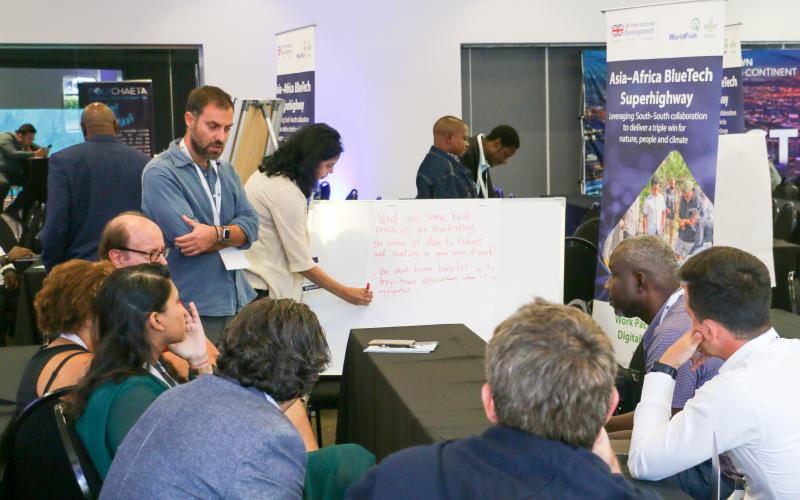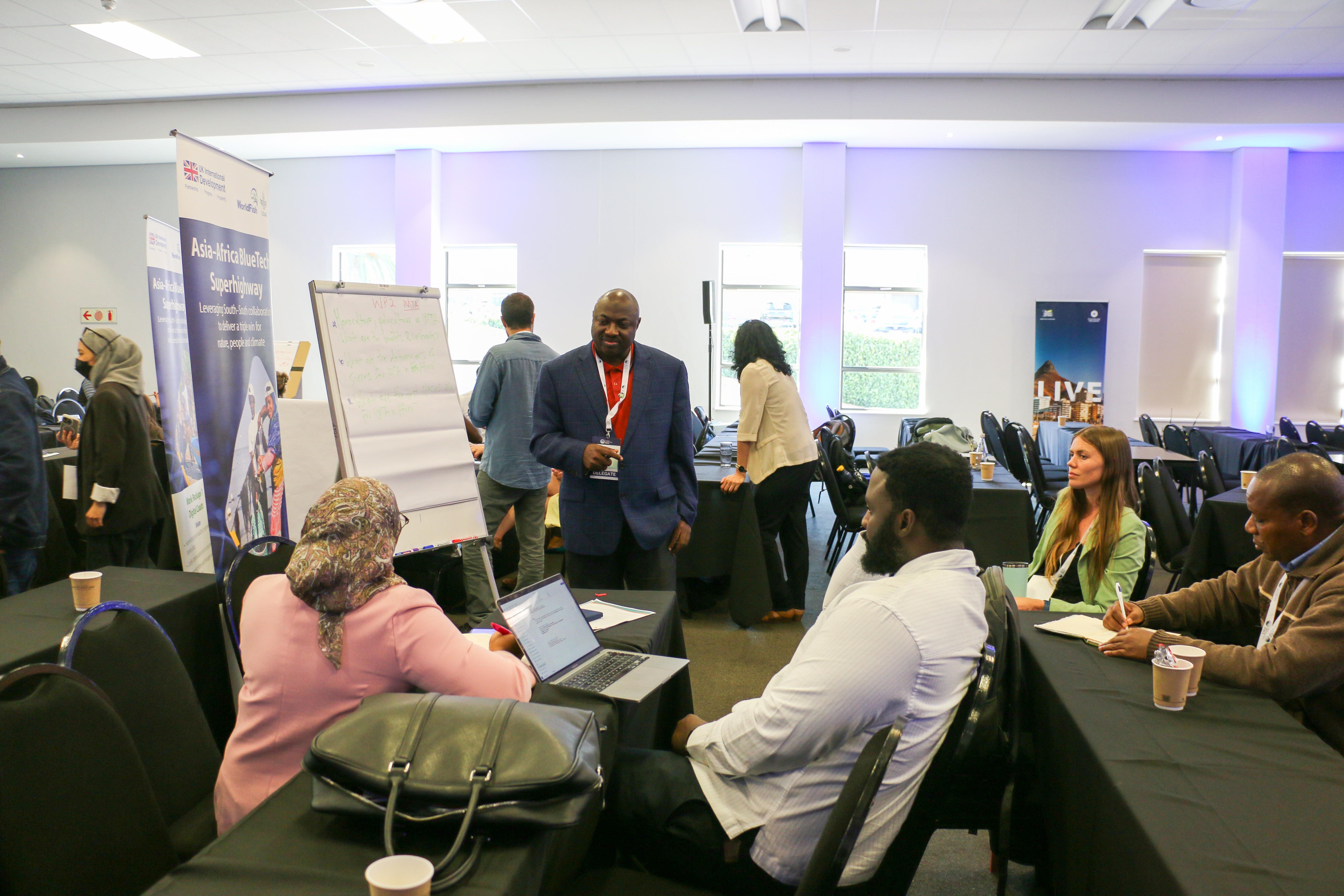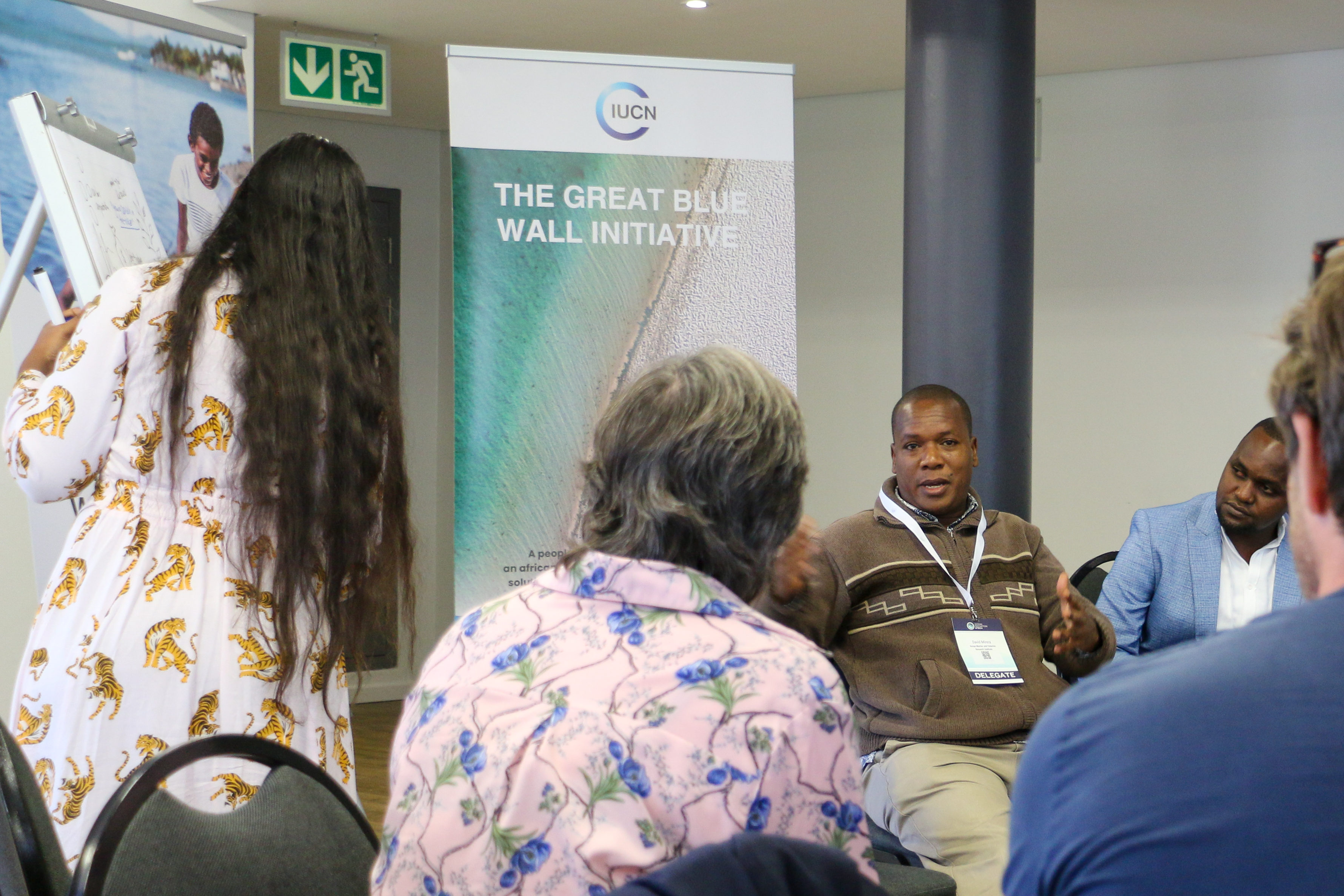
- The Ocean Innovation Africa Conference held in Cape Town, South Africa, showcased latest advancements and insights shaping sustainable aquatic food systems in Africa.
- WorldFish’s Asia-Africa BlueTech Superhighway project (AABS) ran a workshop at the conference to foster partnerships and discussions to scale innovations tailored to African contexts.
- The Ocean Innovation Africa Conference Pitch Competition showcased tangible actions towards a more sustainable and ecologically balanced future.
The 2024 Ocean Innovation Africa conference, held February 20-22 in Cape Town, South Africa, provided a fascinating glimpse into the future of sustainable aquatic food systems as part of sustainable oceans.
WorldFish, through its Asia-Africa BlueTech Superhighway (AABS) project held a workshop, “Scaling innovations to transform aquatic food systems in Africa”, aimed at identifying new partners working in this space and initiating discussions on approaches to scaling innovations in African aquatic food systems. The workshop encouraged stakeholders to share experiences and insights with the aim of finding synergies with AABS project objectives.
Structured around short presentations on AABS’s four work packages and group discussions, the workshop facilitated deep dives into African contexts to create a platform for dialogue, learning, and mutual understanding with local communities, policymakers, and other stakeholders.
A key insight from the workshop was the critical importance of embedding community needs and knowledge in the development and implementation of aquatic food system innovations. This reflects learnings from previous AABS workshops held throughout Africa.
 |
Discussions highlighted that sustainable solutions require more than just technological advancements, they need to be culturally sensitive, economically viable, and ecologically sustainable and tailored to the specific contexts of African aquatic food systems. The significant gap in accessible, climate-smart technologies for small-scale fishers and farmers was also underlined.
Innovations in food processing and storage, disease management in aquaculture, and sustainable fishing practices were identified as key areas needing attention. These technologies have the potential to transform food systems by reducing waste, improving productivity, and ensuring environmental sustainability.
The Ocean Innovations Competition
The Ocean Innovation Africa Conference Pitch Competition saw innovators presenting their solutions before a panel of judges and engage in a Q&A session to delve deeper into the potential impact and viability of their innovation.
MariHealth Solutions, the winner of the competition, highlighted their technology for early disease detection in fish, underscoring the importance of proactive health management to avert aquaculture outbreaks.
Retread Africa revealed their approach to sustainability through recycling initiatives, contributing to the circular economy with a strong environmental impact.
Koraï is involved in creating marine nurseries in Madagascar, promoting the conservation and restoration of marine ecosystems.
ATAREC demonstrated their breakthrough in renewable energy, capturing wave energy to advance the green energy sector.
ReNile which offers IT solutions for smart farming and environmental services, focusing on water quality monitoring and management for aquaculture and hydroponics, accessible via mobile.
Kuza Freezer provide solar-powered cold storage solutions in Africa to reduce post-harvest losses for fisherfolk, aiming for sustainability and increased revenues.
These entrepreneurs presented tangible actions towards a more sustainable and ecologically balanced ocean future.
 |
Workshop Highlights
Throughout the conference, workshops highlighted the multifaceted nature of the blue economy and its potential.
The BlueHub Specialisation workshop hosted by GIZ, and Make-IT in Africa highlighted the critical need for more innovation hubs across Africa. The workshop emphasized the gap in technical expertise and the importance of connecting academia with industry and underscored the lack of corporate and investor engagement.
In another workshop, hosted by the World Economic Forum Friends of Ocean Action and Stanford University Centre for Ocean Action, the complexities and motivations behind investing in small-scale fisheries (SSF) were unpacked, recognizing both the opportunities and challenges including knowledge gaps and post-harvest losses. The key takeaway was the importance of reliable and proactive intermediaries, such as businesses and community organizations, to consolidate stakeholders into larger collectives capable of securing substantial grants, reducing the administrative burden associated with smaller grants.
Universities' role in the blue economy was also scrutinized in a session hosted by Nelson Mandela University Centre for Coastal and Marine Research, shedding light on the critical role of species identification in conservation efforts and the potential for innovation in this area. The session highlighted the contributions of entrepreneurs who have developed tools and methods that support these efforts.
Some hot topics were:
- Prototyping and patenting process, and the need to navigate the challenges of of intellectual property rights to safeguard innovations.
- Data, particularly the use of long-term satellite data for coastal zone management (such as by Digital Earth Africa) and the yawning gap in making it actionable and accessible for communities and policy makers.
- Seaweed and seagrasses as a bedrock for conservation and sustainable blue economy, explored in a workshop held by the International Union for Conservation of Nature (IUCN) Indigenous knowledge as an integral part of coastal community development, with a strong call for knowledge sharing and improving existing practices.
Future Direction
The Ocean Innovation Africa conference offered an opportunity to exchange progress and practices on how to effectively integrate sustainability, innovation, and community empowerment into aquatic food system projects. Insights from the conference emphasize the importance of tailoring research efforts to meet the evolving needs of communities and ecosystems. It also underscored the necessity of developing comprehensive solutions that address not only technical challenges but also social, economic, and environmental factors. Additionally, ensuring that policy frameworks align with sustainable practices and innovation, drawing from on the ground insights for informed decision-making is vital.
In sum, the takeaways for the participants and AABS team will help in collectively navigating the challenges and opportunities within the blue economy towards a future where aquatic food and ecosystems thrive alongside the communities that depend on them.
